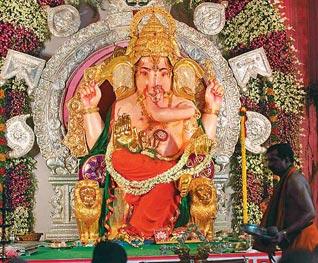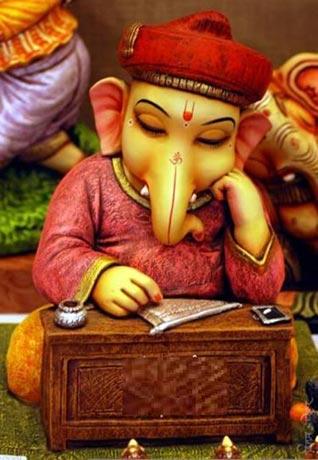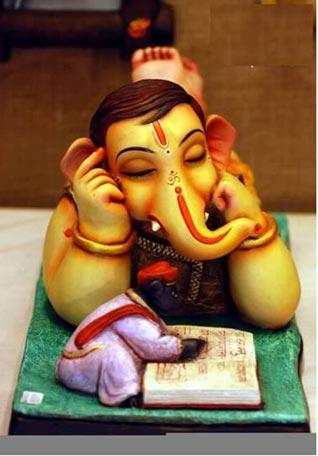Humour
Oh, Ye of Little Faith
by SMRUTI KOPPKAR
Ganesh devotees are now routinely buying millions of dollars (in third-world India!) worth of insurance for their idols - just in case the deity, which promises protection from and destruction of obstacles, does not deliver. Is this, in the world's biggest nest of scams, India's latest racket?
Remember, these very idols are then voluntarily destroyed by the very same devotees, amidst much pomp and ceremony, at the end of the 10-day festival!
Also noteworthy is that much of this entire festival is held under the aegis of the extreme-right-wing Hindu Mafia - the various wings of the Shiv Sena, e.g.
Among the very many sobriquets showered on Ganesh, a.k.a. Ganapati - inarguably the most popularly worshipped deity across Maharashtra, and the rest of Hindu India - are Vighnaharta and Vighna-vinashak, the Remover and the Destroyer of Obstacles.
However, in a telling reflection of the times we live in, Ganesh devotees now believe that they and their lord could do with some insurance coverage ... just in case!
And so, as many as 200 sarvajanik Ganesh mandals in Mumbai - the public or charitable trusts that organise the 10-day festival - have bought modest to hefty insurance. That's a quantum leap from two years ago when barely a dozen had indulged in what had then seemed like a fringe sentiment: insurance for the other-worldly.
"After the 26/11 attacks and this year's repeated warnings that terrorists could strike during the Ganapati festival, many of our members thought it wise to go in for insurance. We can't leave things to chance, can we?" asks Pandurang Jadhav, convenor of Birhanmumbai Sarvajanik Ganeshotsav Samanvay Samiti, the apex body of all the mandals in the city. A majority of the estimated 10,000 mandals across Mumbai are relatively small, but around a thousand host the festival on a grand scale with idols rising from ten to 18 feet in height, and attract devotees in lakhs.
"It's the large ones that are under threat," points out Jadhav.
The Gaud Saraswat Brahmin Samaj Mandal at Wadala, which displays the richest Ganapati idol in the city, has been insured for a whopping Rs 495 million [approx US $ 12 million] this year, nearly five times more than its Rs 100 million cover last year.
Lalbaugcha Raja, the city's tallest and most revered idol, located in the textile mill area of central Mumbai, which saw a million visitors last year, has been insured for Rs 50 million. Even more modest ones were insured for around Rs 5.5 million to 10 million.
"We insured the idol's jewellery (62 kg gold and 300 kg silver), our human resources - , 1000 volunteers and 350 guards - and the mandap itself," reveals Satish Nayak, president of the GSB Mandal.
Pune's famous Dagdusheth Halwai Ganapati Trust too bought insurance this year. "There's always a bomb threat. We have hundreds of city police as well as our own private guards to secure the 5,000 sq ft pandal but there's no harm in taking some insurance," says Ashok Godse, president of the trust. "Some" insurance meant a cover of around Rs 500 million with a premium of Rs 450,000!
In a first of sorts, Nayak insured Ganapati bappa's devotees as well. "We calculated around Rs 1 million per devotee, and have covered 200 devotees inside the mandap, should something go wrong."
Most insurance was sold by state-owned companies, with New India Assurance leading the pack. "We had approached private companies too, but their rules are more stringent," says Sunil Joshi of Lalbaugcha Raja Mandal. A few insurance-seekers wanted to know, rather audaciously, if "lack of devotees" could also be insured; after all, if terror threats kept devotees away, it would adversely affect mandals' incomes. It didn't work. "We have insured every possible aspect but not ‘lack of devotees'; the routine exclusions do apply," says a senior official of New India Assurance. The routine exclusions include war, nuclear explosions, acts of nature.
And, of course, acts of god.
[Pray, which 'god', though?]
[Courtesy: Outlook]
September 23, 2010
Conversation about this article
1: Sangat Singh (Kuala Lumpur, Malaysia), September 24, 2010, 9:45 PM.
I was rather surprised to see no comment forthcoming on such an important topic as Ganesh. Here is something, not my original work but comes from my saved cornucopia with additional comments. No offence is meant but, in any unlikely event, I do tender my sincerest apologies in advance. Here it goes: Ganesh, a wise elephant-man among Hindu gods and goddesses, he only puts obstacles in the way of those seeking a shortcut to heaven. This is to prevent overcrowding and illegal immigration. All in all, he is very much loved and there are many images of him. He is rather greedy and overweight and just loves yummy fruit and drink sacrifices. He does come with a good pedigree - his parents are Shiv and Parvati. He is the sort of god you can talk to. Very user-friendly. He has four arms but his elephant's head bears only one tusk. There are many stories circulating about how this happened. One version goes with Shiv's habit of surprising Parvati in her bath, which she found very annoying. So, from her bodily scrubbings, mixed with oils and ointments, she created a guardian figure and brought it to life with a sprinkling of ganges water. Shiv took one look at the figure barring his way and just lopped its head off. "Look what you've done!" wailed Parvati, "that was our brand new son!" Servants were dispatched to find a new head without delay. The first head they found was that of an elephant. Better than no head at all, thought Parvati, and that was that. This is the official version. Ganesh also snapped off his tusk to use as a pen when he needed to jot down something really important. He is seen as a god of wisdom and prudence, but is never seen carrying a pen. But he does like to carry a few artefacts around with him: a shell, a discus, a club and a water lily, all purely for symbolic value but of no practical value. According to the security rules then and now, he never carries flashlights or pen-knives or anything like that.





